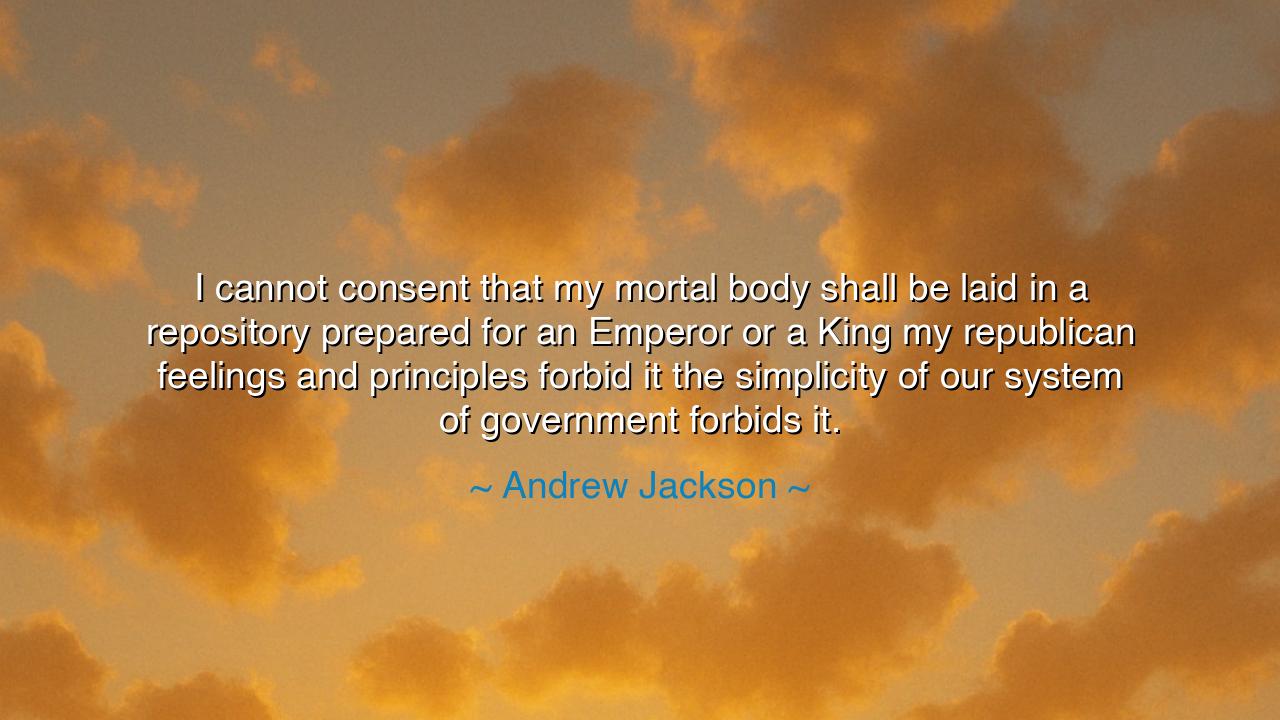
I cannot consent that my mortal body shall be laid in a
I cannot consent that my mortal body shall be laid in a repository prepared for an Emperor or a King my republican feelings and principles forbid it the simplicity of our system of government forbids it.






The words of Andrew Jackson, carved from the bedrock of American humility and defiance, ring with the strength of a man who lived by principle: “I cannot consent that my mortal body shall be laid in a repository prepared for an Emperor or a King. My republican feelings and principles forbid it. The simplicity of our system of government forbids it.” In this declaration, the seventh President of the United States speaks not only of his own death, but of the living soul of the American Republic. He reminds the generations to come that freedom, to endure, must be clothed in simplicity, not adorned in pomp; that the greatness of democracy lies not in grandeur, but in humility.
The origin of this quote lies near the end of Jackson’s life, when plans were being made for his burial. Admirers, inspired by his fame as a military hero and statesman, wished to build him a magnificent tomb—a resting place fit for a king. But Jackson, ever the soldier of the people, rejected the notion with unflinching conviction. To be buried in a monument of marble and splendor, he believed, would betray the very principles he had lived to defend. A republic, unlike a monarchy, honors not crowns and thrones, but character and virtue. “I am no emperor,” he said in essence, “and my nation must have no kings.” Thus, even in death, Jackson sought to embody the spirit of republican simplicity, affirming that in America, honor is measured not by wealth or ceremony, but by service and integrity.
In the style of the ancients, let us uncover the deeper wisdom within his words. Jackson’s statement is not merely about the vanity of tombs—it is about the moral architecture of democracy. When a people forget simplicity, they begin to crave spectacle; when they crave spectacle, they grow accustomed to worshiping power rather than virtue. The founders of the Republic understood this danger. They built a government not upon the splendor of rulers, but upon the quiet dignity of citizens. To Jackson, who had risen from poverty to the presidency through courage and perseverance, this principle was sacred. He saw the Republic as a living covenant between equals, and any display of royal pretension was an insult to that sacred trust.
History offers many mirrors to this truth. Consider the downfall of Rome, once a republic of citizen-soldiers, transformed into an empire of tyrants. Its leaders began as servants of the people but ended as gods upon their own altars, surrounded by marble, slaves, and glory. The same pattern haunts every nation that forgets the virtue of simplicity. Jackson, a man steeped in both war and politics, knew that the temptation of power is eternal. He had fought kings in battle, both literal and symbolic—first the British crown on the field of New Orleans, and later the “moneyed aristocracy” of banks and elites within his own land. His refusal to rest in a king’s tomb was his final act of defiance, his last sermon against the corruption of pride.
There is something profoundly human in this gesture. In life, Jackson was fierce, controversial, often unforgiving—but in this moment, he was humble before eternity. He recognized that when death comes, it makes all men equal. “My mortal body,” he said—emphasizing the word mortal—for he knew that no monument, no title, no monument of gold could shield him from that truth. And so, he chose simplicity, not as an aesthetic, but as a moral statement. The truest monument to a republic, he taught, is not built in stone—it is built in the hearts of its people, in their adherence to virtue, courage, and equality.
This principle still speaks to the soul of every free society. For in our own time, the hunger for grandeur often disguises itself as progress. We build ever larger monuments, seek ever greater fame, and confuse noise for greatness. But Jackson’s words stand as a warning: a republic that begins to worship its leaders will soon forget to honor its laws. When citizens become spectators instead of participants, when they exalt individuals instead of principles, democracy begins to rot from within. The simplicity Jackson cherished was not smallness—it was strength; not denial of greatness, but its purification.
So, my children of the future, learn from Andrew Jackson’s humility in death as from his courage in life. Remember that the glory of a republic is not in its palaces but in its people; not in the crowns it wears, but in the conscience it keeps. Let no man be raised so high that he forgets he is mortal, and let no nation forget that equality is its true throne. Seek simplicity in your lives and in your government—for in simplicity lies purity, and in purity lies freedom.
For as Jackson taught, the Republic forbids kings, even in their graves. It demands not splendor, but sincerity; not monuments, but memory. And when you pass from this life, let it not be your tomb that speaks for you, but the deeds you have left behind—the quiet proof that you served not yourself, but the people, and that you lived, as Jackson did, with the heart of a citizen and the spirit of a free man.






AAdministratorAdministrator
Welcome, honored guests. Please leave a comment, we will respond soon